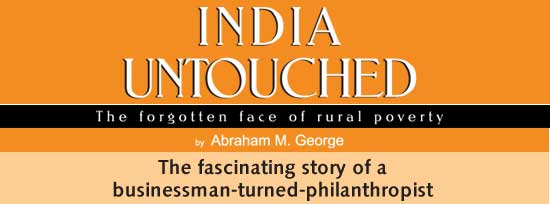
The Hindu - Book review
Dilemmas in poverty alleviation
INDIA UNTOUCHED — The Forgotten Face of Rural Poverty: Abraham M. George;
EastWest Books ( Madras) Pvt. Ltd., 571,
Poonamalle High Road, Aminjikarai, Chennai-600029.
Rs. 295.
A FRIEND, Raj, once visited a small town in Gujarat. Got talking to a young man, Deepak, who said, "Come see my home." Raj had a few minutes, so they strolled through the town, through a patch of garbage and a stinking overflowing drain, to some lean-to shanties set among some thorn bushes — Deepak's little community's homes.
Raj knelt and looked into his home, said hello to his wife and daughter. Then it was time for Raj to leave.
Need for empathy
On the way back, Deepak suddenly stopped and said to Raj in Hindi, "Don't ever lose the feeling for the poor I can see you have in your heart." Raj says he was speechless, suddenly close to tears. It was both a compliment always to be treasured and the saddest thing he ever heard.
All Raj had done was spend a few minutes with Deepak, as with anyone else. Yet, these words showed how novel an experience even that was for Deepak. That was a glimpse into a sad reality — the prejudice and lack of basic hu manity that are part of everyday life for the rural poor.
I read Abraham George's book in the hope that he had stories like this, and insights from them, to share. He did have them and he does share them.
The problem is, there is so much else in his book that by the end, you have lost track. It is hard to say that, really. Because George is clearly passionate, committed, persevering and crystal clear about what he wants to achieve and he achieves a lot.
Initiatives
His Shanti Bhavan School in one of Tamil Nadu's poorest districts is set up on admirable lines. It selects its students in just the right way. The health care initiatives he has taken are what the rural poor need. And no doubt all this is making a difference to people's lives. And that's just the point.
This book should have been about exactly those things. It should have told us some of the myriad experiences the author has undoubtedly had along the way. It should have told us the lessons he has learned.
And again, it does tell us those things. But they just get drowned. Maybe what I'm trying to say is, George should have focussed this book. It would have had much greater impact.
His grasp of the problems that weigh India down is impressive, his breadth of knowledge about them even more so. But after 300 pages, you start to wonder, wait a minute, was there really stuff here about rural poverty?
Because on the 300th page, you read that the U.S. Senator Alan Simpson once said, "If you have character, that is all that matters. And if you do not have character, that is all that matters too."
And this is in a discussion on "Fair and truthful reporting." And that is after reading about AIDS, terrorism, corruption, bureaucracy, the Kyoto Protocol and the Earth Summit, Gujarat 2002 and lead poisoning and ahead in the book are journalism, arts and culture, Hindu philosophy, ethics and foreign policy, besides quotes from Flaubert and Macchiavelli, Gandhiji and Picasso. And much more. Perhaps all of these have some bearing on the face of rural poverty; certainly the author knows a great deal about them.
Certainly he has worked hard on most of these issues, whether learning about them or doing something about them. But the question is, should they all have been in this book?
Dilemmas
The author once received a large shipment of American wheat for kids in Shanti Bhavan. The customs officer wanted a bribe, which, "as a matter of principle," George refused to pay. Eventually, he had to burn the wheat.
Looking back, says George, he is not sure he made the right decision. "On an ethical principle, I sacrifice(d) the welfare of several hundred children and poor people and allowed the destruction of a valuable food item." Hold on to your ethics? Or feed needy kids? That is the sort of tragic dilemma poverty in India throws in your face. My friend Raj knows.
DILIP D'SOUZA